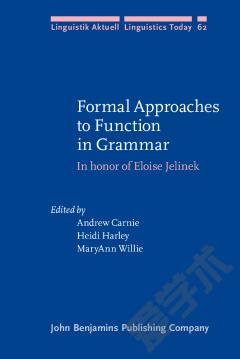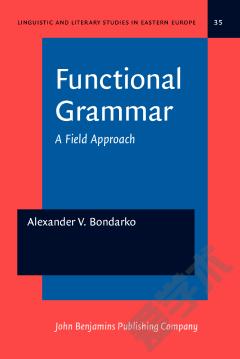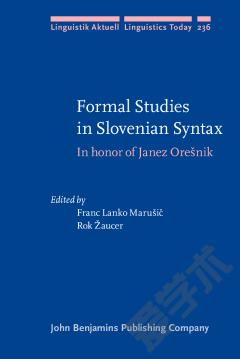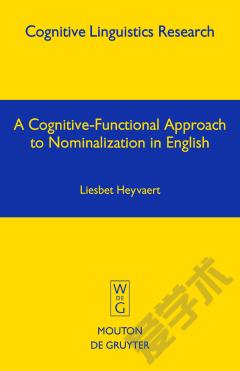Formal Approaches to Function in Grammar. In honor of Eloise Jelinek.
1. Contributors 2. Acknowledgments 3. Introduction: Formalizing Functionalism (by Carnie, Andrew) 4. Part I: The Pronominal Argument Hypothesis 5. On the significance of Eloise Jelinek's Pronominal Argument Hypothesis (by Hale, Kenneth L.) 6. Categories and pronominal arguments (by Bach, Emmon) 7. Doubling by Agreement in Slave (Northern Athapaskan) (by Rice, Keren) 8. Quasi objects in St'at'imcets: On the (semi-)independence of Agreement and Case (by Davis, Henry) 9. Agreement, dislocation, and partial configurationality (by Baker, Mark C.) 10. Part II: Interfaces 11. Multiple multiple questions (by Diesing, Molly) 12. Attitude evaluation in complex NPs (by Nichols, Lynn) 13. Topic-Focus articulation and degrees of salience in the Prague Dependency Treebank (by Sgall, Petr) 14. Word order and discourse genre in Tohono O'odham (by Fitzgerald, Colleen M.) 15. The prosody of interrogative and focus constructions in Navajo (by McDonough, Joyce) 16. Subject number agreement, grammaticalization, and transitivity in the Cupeno verb construction (by Hill, Jane H.) 17. Lexical irregularity in OT: DOT vs. Variable Constraint Ranking (by Archangeli, Diana) 18. Rapid perceptibility as a factor underlying universals of vowel inventories (by Warner, Natasha) 19. Part III: Foundational issues 20. Argument hierarchies and the mapping principle (by Jelinek, Eloise) 21. Focus movement and the nature of uninterpretable features (by Karimi, Simin) 22. Merge (by Langendoen, D. Terence) 23. Phonotactics and probabilistic ranking (by Hammond, Michael) 24. Deconstructing functionalist explanations of linguistic universals (by Bever, Thomas G.) 25. References 26. Name index 27. Subject index
{{comment.content}}








 京公网安备 11010802027623号
京公网安备 11010802027623号